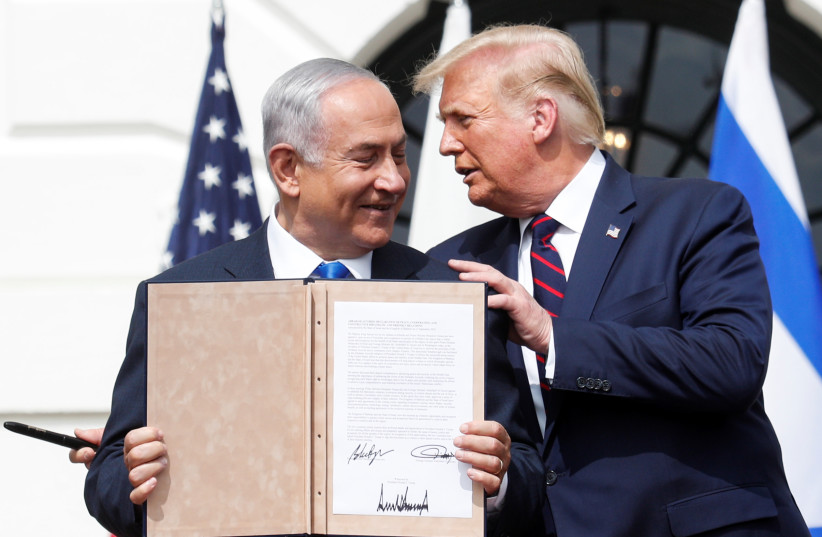Comments made by Donald Trump in two interviews to Israeli journalist Barak Ravid shed a new and problematic light on the relationship between the former US president and former prime minister Benjamin Netanyahu. As broadcast by Channel 12 News on Saturday night, Trump accused Netanyahu of deceiving him and his administration about his sincerity to make a peace deal with the Palestinians. He also expressed tremendous frustration at the congratulatory video message the then-prime minister sent Joe Biden when he declared his US presidential win.
In an answer to a question about the video, Trump reportedly fumed: “I haven’t spoken with him since [he congratulated Joe Biden]. F*** him.”
The comments were made in interviews Ravid conducted in April and July for his book Trump’s Peace: The Abraham Accords and the Reshaping of the Middle East.
Whatever one might think of Trump as a person, Israel has much to thank him for on the diplomatic level. His support of Israel was especially appreciated coming on the heels of Barack Obama’s 2016 parting shot allowing the UN Security Council to pass a resolution negating Israeli ties across the Green Line, including in Jerusalem.
During the Trump administration, the US took several important steps for Israel. The most significant, of course, was relocating the US Embassy to Jerusalem, recognizing it as the Israeli capital. The US under Trump also recognized Israeli sovereignty over the Golan Heights. Trump pulled out of the severely flawed JCPOA nuclear deal with Iran and acted against the innate bias against Israel in the UN. Former secretary of state Mike Pompeo also dismissed the widely held international stand that Jewish communities in Judea and Samaria (the West Bank) are inherently illegal. And it was a team under Trump that managed to bring about the hugely important Abraham Accords, establishing relations between Israel and the UAE, Bahrain, Sudan and Morocco.

All this has to be, and has been, acknowledged. But this, however, does not mean that the government, and the prime minister at its head, should consider themselves beholden to one side of the American political system alone.
Clearly, the background to Trump’s unflattering comments stems from his resentment over his election defeat and his antipathy toward those he believes were not sufficiently loyal.
“Nobody did more for Bibi and Israel than I did,” said Trump. “Also money. We gave a lot of money, I gave troops, everything we did.” It is not clear what he was referring to regarding providing Israel with troops.
Depicting a sense of betrayal after Netanyahu congratulated Biden, Trump said: “I liked Bibi. I still like Bibi. But I also like loyalty. The first person to congratulate Biden was Bibi. And not only did he congratulate him, he did it on tape.”
Actually, many world leaders congratulated Biden before Netanyahu, who took 12 hours to send his message.
“For Bibi Netanyahu, before the ink was even dry, to do a message, and not only a message, to do a tape to Joe Biden talking about their great, great friendship – they didn’t have a friendship, because if they did, [the Obama administration] wouldn’t have done the Iran deal,” said Trump. “And guess what? Now they’re going to do it again. And if they do it again, Israel is in very grave danger.
“I’ll tell you what – had I not come along I think Israel was going to be destroyed. Okay. You want to know the truth? I think Israel would have been destroyed maybe by now.”
Without detracting from the importance of what Trump as president of the US did for Israel, it should be remembered it was precisely that: the relationship between two countries, two longstanding allies.
Netanyahu did the right thing to send a message to Biden as incoming president. Although Trump had not conceded defeat in the election, it was clear there was going to be a change in government.
Israel’s relationship with the US is too important to place on partisan lines.
The ties should not depend on who is leading either country. The alliance is between the two countries, not between two political figures.
